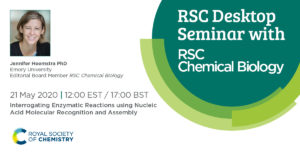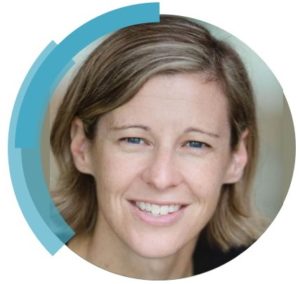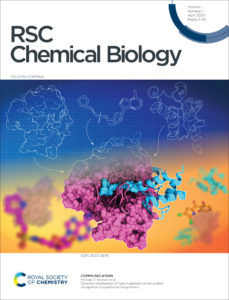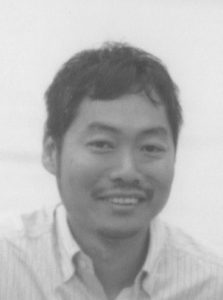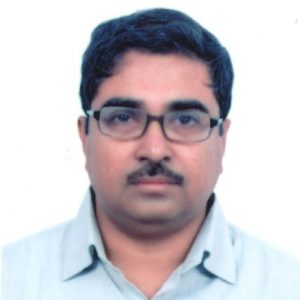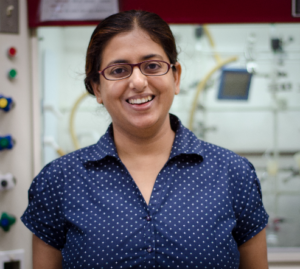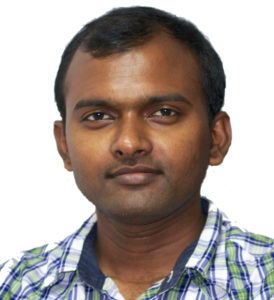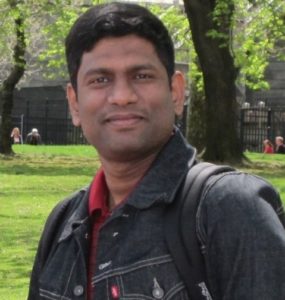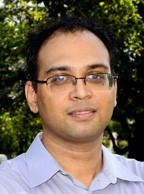The RSC is proud to recognise exceptional scientists through our series of journal lectureships. Typically, our winners are given the opportunity to present their award-winning work at international conferences or meetings, which has not been possible this year due to the disruption to in-person events caused by the global pandemic.
As a result, the RSC is delighted to announce our inaugural free, online-only RSC Desktop Seminar Lectureship Series, featuring virtual talks by our recent journal lectureship winners. Each session will include an introductory talk by a journal board member as well as the lectureship winner.
The RSC Desktop Seminar Lectureship Series is an effort to not only replace in-person research seminars during the current pandemic situation but to also expand access for researchers around the world looking to connect to some of the leading minds in the chemical sciences. The RSC Desktop Seminar Lectureships will take place during a variety of time zones to accommodate our winners from different regions, so we encourage any and all interested to register and attend.
The 2021 RSC Desktop Seminar Lectureship Series has now ended. A full list of the events which were held can be found below – we look forward to meeting you at our future events!
Past events:
ChemComm Emerging Investigator Lectureship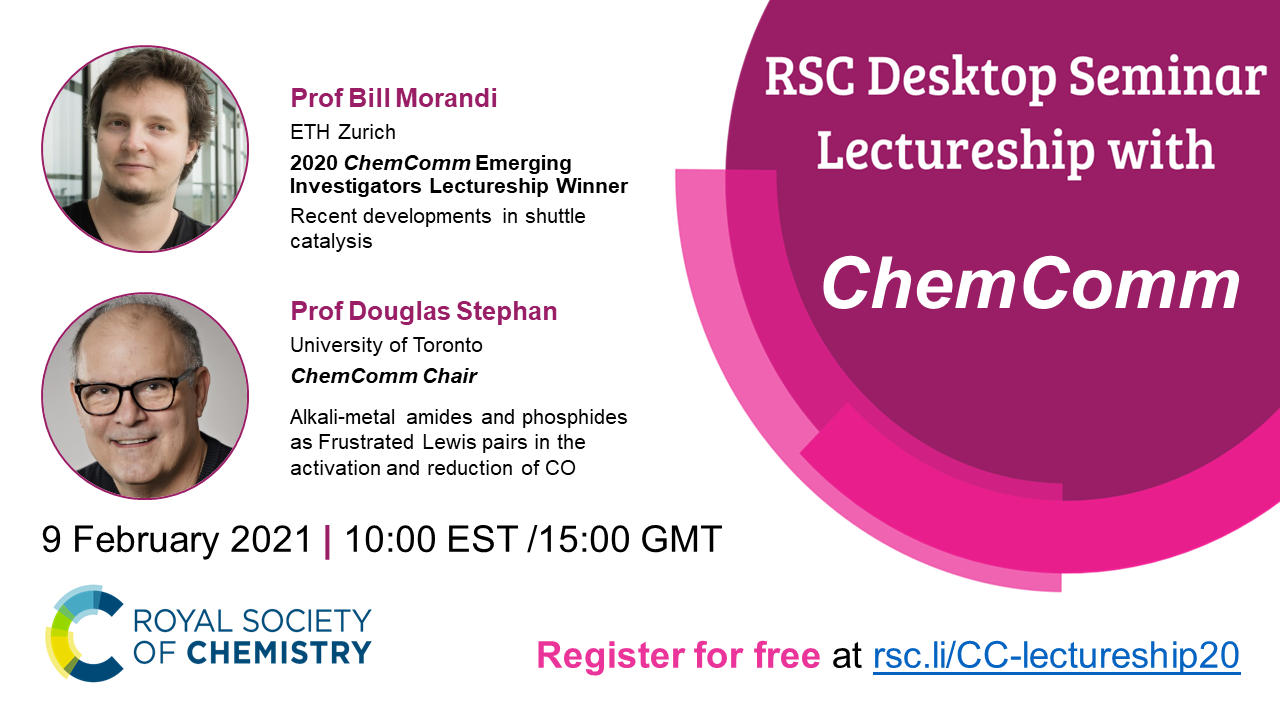
JAAS Emerging Investigator Lectureship
Join us Thursday, 18 February
10:00 – 11:30 am EST | 7:00 – 8:30 am PST | 15:00 – 16:30 GMT
Featuring talks from Editorial Board member Dr Vassilia Zorba and lectureship winner Dr George L. Donati
Analyst Emerging Investigator Lectureship
Join us Tuesday, 23 February
16:00 – 17:30 CST | 17:00 – 18:30 KST | 8:00 – 9:30 GMT
Featuring talks from Associate Editor Professor Jaebum Choo and lectureship winner Dr Yi-Lun Ying
2019 Journal of Materials Chemistry Lectureship
Join us Thursday, 11 March
9:00 – 10:30 GMT | 17:00 – 18:30 CST | 18:00 – 19:30 KST
Featuring 2019 Journal of Materials Chemistry Lectureship winner Professor Qiang Zhang and Journal of Materials Chemistry A & Materials Advances Associate Editor Professor Kisuk Kang
Natural Product Reports Emerging Investigator Lectureship
Join us Monday, 15 March
14:00 – 15:30 GMT | 10:00 – 11:30 EDT
Featuring 2020 lectureship winner Professor Alison Narayan and NPR Editorial Board member Professor Marnix Medema
2019 EES Lectureship
Join us Thursday, 18 March
15:00 – 16:30 CET | 10:00 – 11:30 EDT | 14:00 – 15:30 GMT
Featuring talks from EES Editorial Board member Professor Linda Nazar and lectureship winner Dr Maria Lukatskaya
PCCP Emerging Investigator Lectureship
11:00 AM – 12:30 PM CET | 10:00 – 11:30 GMT
Featuring talks from Associate Editor Professor Bo Albinsson and lectureship winner Dr Federico Calle-Vallejo
2020 Journal of Materials Chemistry Lectureship
9:00 – 10:30 EDT | 13:00 – 14:30 GMT | 14:00 – 15:30 CET
Featuring 2020 Journal of Materials Chemistry Lectureship winner Professor Giulia Grancini and Journal of Materials Chemistry C & Materials Advances Associate Editor Professor Yana Vaynzof
Biomaterials Science Lectureship
Join us Tuesday, 30 March
8:00 – 9:30 AM EDT | 12:00 – 13:30 GMT | 20:00 – 21:30 CST
Featuring talks from Editor-in-Chief Professor Jianjun Cheng and lectureship winner Dr Kanyi Pu
2020 EES Lectureship
Join us Wednesday, 31 March
10:00 – 11:30 CDT | 15:00 – 16:30 GMT | 16:00 – 17:30 CET |
9am Central US Time; 3pm UK; 4pm Germany
Featuring talks from EES Editorial Board Chair Professor Joseph Hupp and joint lectureship winner Dr Yana Vaynzof
Polymer Chemistry Lectureship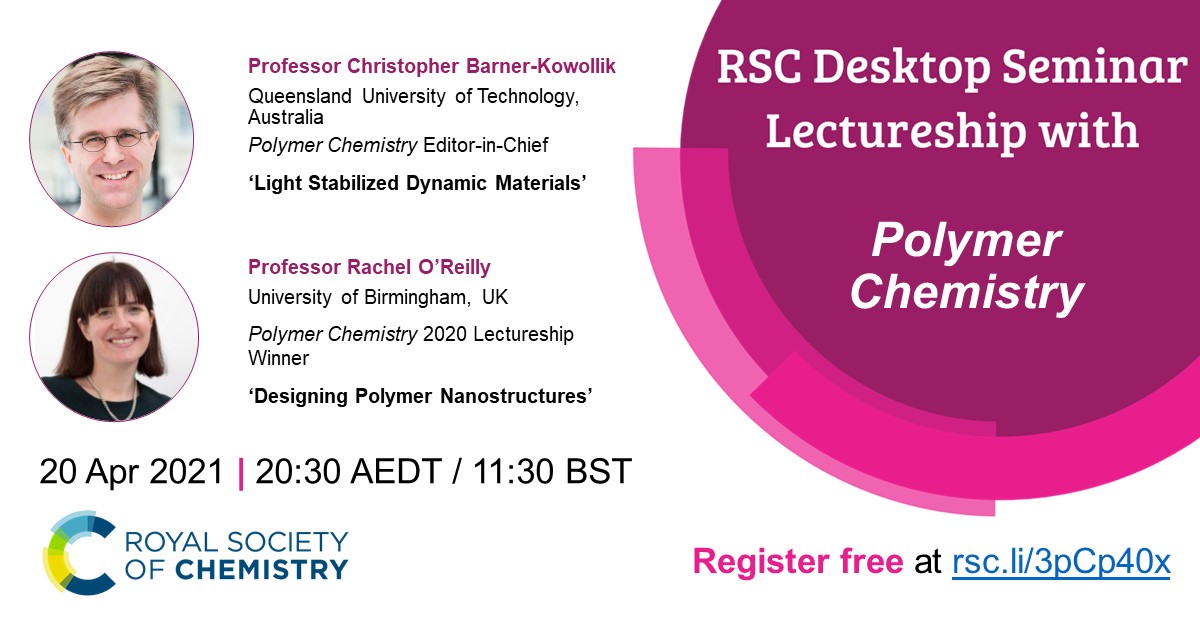
Join us Tuesday, 20 April
20:30 – 22:00 PM AEDT | 10:30 – 12:00 GMT
Featuring talks from Editor-in-Chief Professor Christopher Barner-Kowollik and lectureship winner Professor Rachel O’Reilly
ChemSocRev Pioneering Investigator Lectureship
Join us Wednesday, 21 April
2:00 PM – 3:30 PM CDT | 12:00 – 1:30 PM PDT | 19:00 – 20:30 GMT
Featuring talks from ChemSocRev Advisory Board member Professor Shirley Meng and lectureship winner Dr Jun Lu
2020 EES Lectureship
Join us Tuesday, 27 April
6:00 – 7:30 PM KST | 9:00 – 10:30 GMT
Featuring talks from EES Advisory Board member Professor Kyung Byung Yoon and joint lectureship winner Dr Wooyul Kim
Soft Matter Lectureship
Join us Thursday, 29 April
09:00 – 10:30 EST | 14:00 – 15:30 BST
Featuring talks from Soft Matter Editor-in-Chief Professor Darrin Pochan and lectureship winner Dr Valeria Garbin
Lab on a Chip Pioneers of Miniaturization Lectureship
Join us Thursday, 13 May
12:00 – 13:30 PST | 20:00 – 21:30 BST
Featuring talks from former Lab on a Chip Editor-in-Chief Professor Abe Lee and lectureship winner Dr Wilbur A. Lam
Find out more about the RSC’s recent prizes and awards, journal lectureships, and upcoming events.


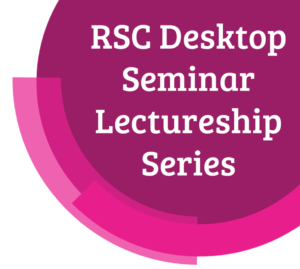
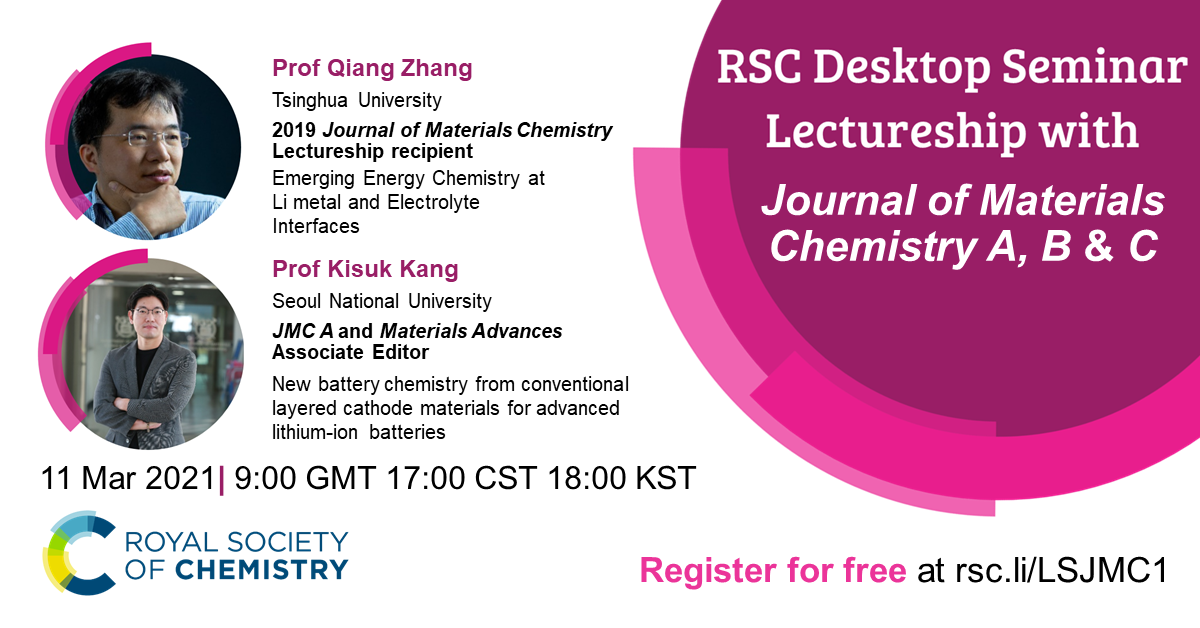
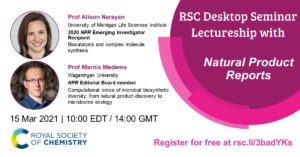
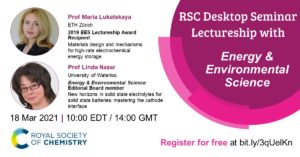
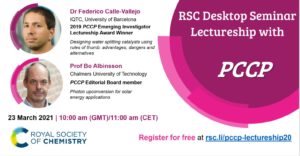
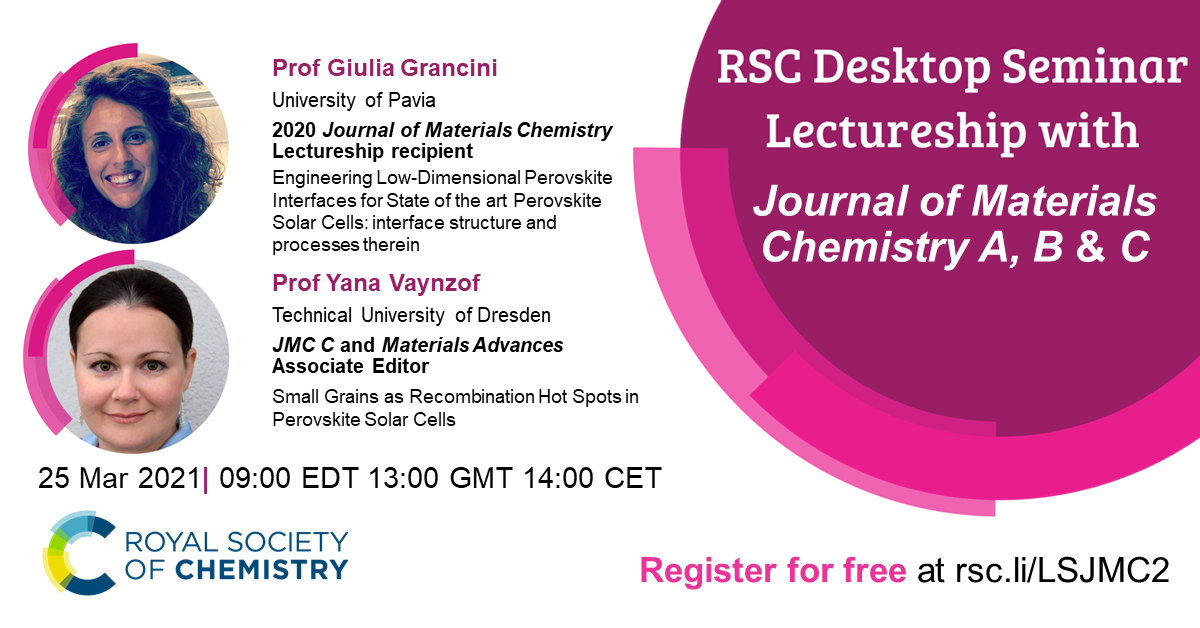
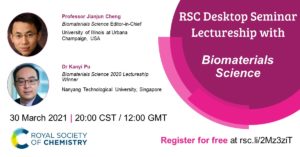
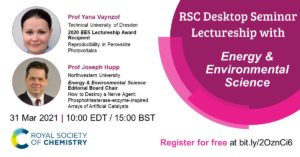
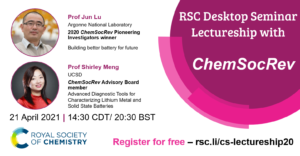
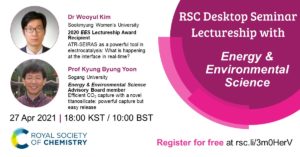
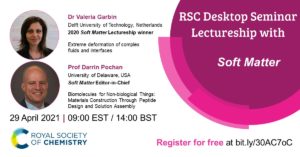
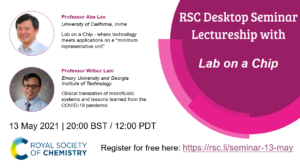










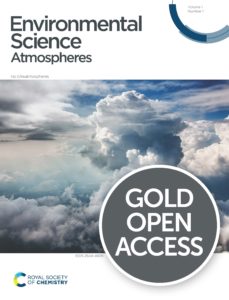
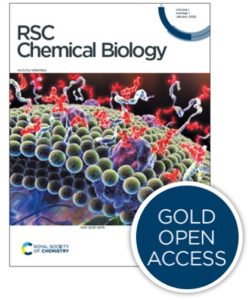 COVID-19 has rendered in-person events to be suspended or cancelled disrupting connections around the globe. The impact of these cancellations on the sharing of information and ideas, especially in the research landscape, has been dramatic.
COVID-19 has rendered in-person events to be suspended or cancelled disrupting connections around the globe. The impact of these cancellations on the sharing of information and ideas, especially in the research landscape, has been dramatic.